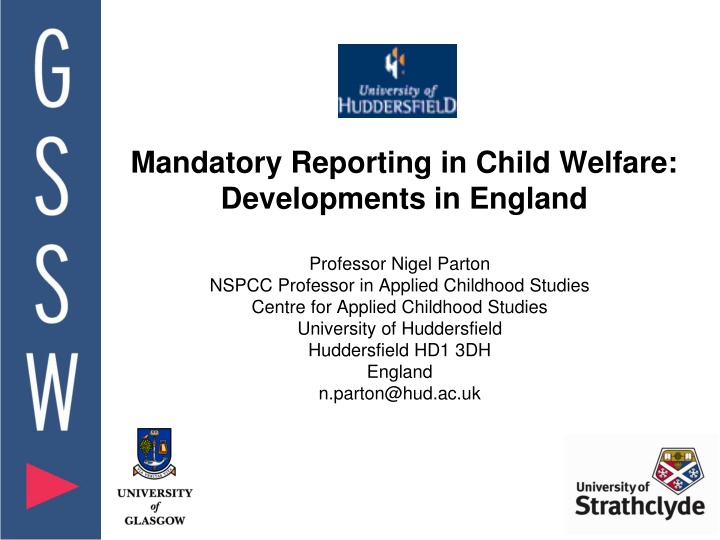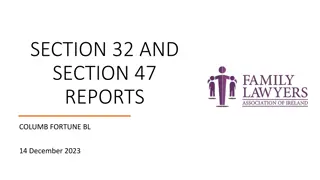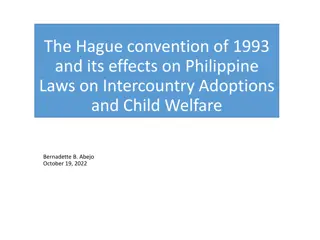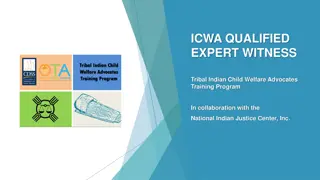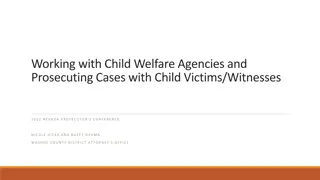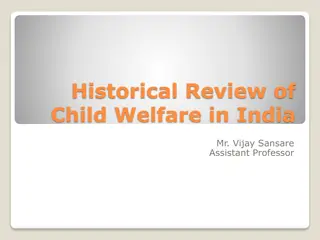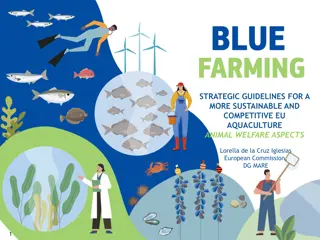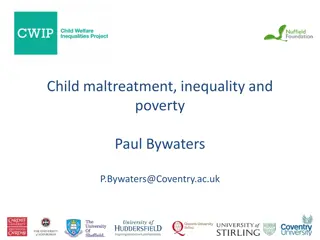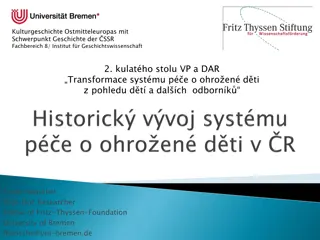Evolution of Child Welfare Policy in England
Since the public inquiry into the death of Maria Colwell in 1973/74, public inquiries have been instrumental in driving policy, practice, and legislative changes in child welfare and protection in England. The tragic cases of Maria Colwell and Victoria Climbe led to significant reforms, including the Children Act 2004. These reforms aim to strike a balance between family support and child protection, emphasizing early intervention to prevent long-term issues in children's lives.
Download Presentation

Please find below an Image/Link to download the presentation.
The content on the website is provided AS IS for your information and personal use only. It may not be sold, licensed, or shared on other websites without obtaining consent from the author.If you encounter any issues during the download, it is possible that the publisher has removed the file from their server.
You are allowed to download the files provided on this website for personal or commercial use, subject to the condition that they are used lawfully. All files are the property of their respective owners.
The content on the website is provided AS IS for your information and personal use only. It may not be sold, licensed, or shared on other websites without obtaining consent from the author.
E N D
Presentation Transcript
University logo and Link to University homepage Mandatory Reporting in Child Welfare: Developments in England Professor Nigel Parton NSPCC Professor in Applied Childhood Studies Centre for Applied Childhood Studies University of Huddersfield Huddersfield HD1 3DH England n.parton@hud.ac.uk
2 Since the public enquiry into the death of Maria Colwell, whilst under the supervision of local authority social workers in 1973/74, the major driver for policy, practice and legislative change in child welfare and protection in England has been public enquiries which have received major media coverage.
3 These issues came to a head with the publication of the public enquiry, chaired by Lord Laming (2003), into the death of Victoria Climbie in 2000. The government responded with the publication of the Green Paper Every Child Matters (2003) and the Children Act 2004 which will fundamentally reconfigure the organisation and delivery of all children s services in England and which has to be in place for 2008.
4 Victoria, born and brought up in the Ivory Coast, had been known to 5 Social Services Departments, 2 hospitals, 2 police child protection teams, and one voluntary child protection agency in the 9 months she lived in London with her aunt after her arrival from France. The enquiry argued that there were at least 12 occasions when Victoria could have been saved but on each occasion there was a failure to share information so that the signs of her abuse were never recognised. In particular, the case was never responded to as a child protection case but was always seen as one of family support requiring the provision of help and services to try and better meet the needs of both herself and her aunt for example trying to provide appropriate housing.
5 The issue of the most appropriate balance between family support and child protection has been central for child welfare policy and practice since the late 1980 s. The current changes are the most radical ever developed to response to this issue and in my opinion are the most radical anywhere in the Western World. To understand why this is the case it is important to recognise that the changes currently being implemented have a much longer genealogy than responding to the death of Victoria Climbie. The changes aim to take forward the idea that it is important to intervene at a much earlier stage in children s lives in order to prevent a range of problems in later life, particularly in relation to educational attainment, unemployment and crime so that all children can fulfil their potential.
6 Underpinning the changes outlined in the Green Paper are two basic assumptions concerning the nature of recent social change and the current state of knowledge. First, over the previous generation children s lives have undergone profound change . While children now have more opportunities than ever before and have benefited from rising prosperity and better health, they also face more uncertainties and risks. They face earlier exposure to sexual activity, drugs and alcohol, and family patterns have changed significantly. There are more lone parents, more divorces and more women in paid employment, all of which have made family life more complex and the position of children more precarious.
7 Second, the Green Paper also asserted that these changes have come about at a time when we now have increased knowledge and expertise and therefore are in a better position to respond to these new uncertainties and risks. In particular, we better understand the importance of early influences on the development of values and behaviour (p15).
8 we have a good idea what factors shape children s life chances. Research tells us that the risk of experiencing negative outcomes is concentrated in children with certain characteristics and experiences (p17). These include: Low income and parental unemployment Homelessness Poor parenting Poor schooling Postnatal depression amongst mothers Low birth weight Substance misuse Individual characteristics, such as intelligence Community factors, such as living in a disadvantaged neighbourhood
9 The other area where knowledge and expertise has grown and which is seen as vital to take policy and practice forward, is in relation to the major changes that have taken place in relation to ICT. The age of e-government is seen as having major implications for the reform and development of children s services. Not only would this provide the potential for identifying problems and enhancing attempts to intervene at an earlier stage, but it would allow different organisations and professionals to share information in order to ensure that children s problems are not missed and children do not fall through the net . The introduction of more integrated children s services is seen as crucially dependent on the introduction of new ICT systems.
10 As the title of the Green Paper - Every Child Matters implies the changes apply to all children as all are seen as being potentially vulnerable at some time in their lives. It is seen as important to ensure the integration of universal, targeted and specialist services, so that universal services are conceptualised as offering early intervention to prevent the emergence of specific problems before they become chronic.
11 A key element of the changes aimed to improve integration is the need for a wide range of health, welfare, education and criminal justice agencies to share information where there is a cause for concern concerning a child s health and development. In effect and for the first time England is introducing a mandatory reporting system, based not on evidence or risk of child maltreatment, but upon the notion of a cause for concern for a child s health and development but where there is no definition of a cause for concern either in the legislation or as yet regulations.
12 Section 12 of the Children Act 2004 empowers the Secretary of State to establish and operate databases about children. The national database will be called the Information Sharing Index (IS Index) and all 150 local authorities in England will be responsible for compiling a database on all children in their area.
13 The database will contain: The child s name, address, gender and date of birth; A number identifying the child; The name and contact details of any person with parental responsibility or who has care of him/her at any time; The name and contact details of any educational institution, primary medical services, or any specialist or targeted service which is, or has been, provided to the person by, or on behalf of, a local authority; The name and contact details of a lead professional for that child (if appointed); and If Child Benefit is being claimed, the name and address of the claimant. Disclosure of this information is mandatory and regulation 4 provides that it may be made even if a rule of common law might otherwise prohibit or restrict the disclosure or provision of information
14 Section 12 also allows for the inclusion of any other information, excluding medical records or other personal records, as the Secretary of State may specify by regulation. For sensitive services (i.e. those relating to sexual health, mental health, and substance abuse) information will only be included on the database with the consent of the person or young person. The lack of consent can be overridden in certain circumstances to be specified in future regulations, but will include cases where there are genuine child protection concerns. Access to the contact details of personnel in sensitive services will be restricted to index management teams.
15 In addition to the information about services in contact with the child, Section 12 allows for the inclusion of information as to the existence of any cause for concern in relation to him (the child) . While the current regulations do not specify how this will operate current government guidance is that professionals will have a facility to enter an indication on one of three criteria: To show that there is information to share An assessment has taken place Action has taken place The degree to which entering an indication will be optional or mandatory is unclear but, to date, all elements of the database that have been implemented have been on a mandatory basis
16 A benefit for the government in making entering data on the database mandatory is that it becomes compliant with the Data Protection Act 1998 which allows for information sharing if there is a statutory duty to do so. Whether this strategy is compliant with the Human Rights Act 1998 is not clear and is likely to be settled through court action.
17 Whether or not entering an indication is mandatory, it will involve professional judgement in determining whether a case meets the criteria. Therefore, the precision of the definitions of the criteria will be crucial in determining the efficiency and reliability of the reporting system. A cause for concern includes concerns about abuse and neglect but such concerns are not treated any differently from other problems or needs which a child might have in relation to their health and development since the Index cannot contain sensitive case information.
18 A major effect of the changes will be to fundamentally reconfigure the relationships between the state, professionals, parents and children for new and wide-ranging systems of surveillance are being introduced. England is in the process of introducing a mandatory reporting system but not based on any notion of child abuse but on the basis of a cause for concern , which is not defined in legislation. The accumulation and exchange of information about children takes on a key role to ensure that children do not fall through the various nets designed to protect them from social exclusion, delinquency, or poor educational achievement and ensure they receive early help and thereby fulfil their potential. Abuse becomes only one of many causes for concern. In attempting a policy and practice shift which aims to both prioritise prevention and early intervention while strengthening protection, the role of the state both broadens and becomes more interventive and regulatory at the same time.
